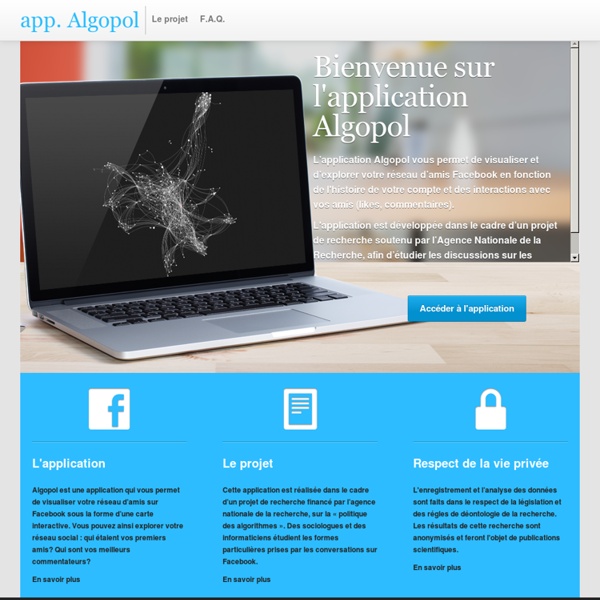



The evolution of memes on Facebook La France, numéro un mondial des demandes de suppression de tweets Le Monde.fr | • Mis à jour le | Par Martin Untersinger Au second semestre 2013, les autorités et les associations françaises ont découvert Twitter. C'est ce que l'on pourrait penser lorsqu'on se penche sur les statistiques publiées, jeudi 6 février, par le réseau social. Au premier semestre de l'année 2013, les autorités françaises ont déposé seulement trois demandes de suppression de contenu auprès de Twitter. Au second semestre, ce chiffre est multiplié par 100 : entre le 1er juillet et le 31 décembre 2013, 306 demandes ont été adressées à Twitter, visant un total de 146 comptes. Tout aussi surprenant, les demandes de suppression de contenu émanant de la France représentent 87 % du nombre total de requêtes similaires dans le monde. Le réseau social précise sur son site que « plus de 300 demandes » émanent d'une « association nationale » et concernent des contenus « illégaux et discriminatoires ». Lire aussi Twitter sommé de respecter le droit français
Le monnaie virtuelle Bitcoin débarque sur Facebook Le Bitcoin devient désormais social, une société du nom de QuickCoin, basée à San Francisco aux Etats-Unis, a développé une application qui permet de recevoir mais également d’envoyer des Bitcoins à travers le réseau social Facebook et ce à sa communauté, à ses amis. La nouvelle application devrait permettre de faciliter les échanges, du moins c’est ce que pense et espère le président de cette société nouvellement créée, Marshall Hayner, dont l’objectif est de familiariser le grand public avec cette monnaie qui selon lui est vouée à un grand avenir.
Secret, le nouveau réseau social où l'on reste anonyme Home > Mobilité > Lancement de « Secret », le réseau social anonyme Dévoilé il y a quinze jours et uniquement disponible aux États-Unis et sur iPhone, Secret est un nouveau réseau social où l’on reste anonyme. Un Facebook où il n’y a pas de profil, ni de nom dans les posts et où toutes les rumeurs peuvent être lancées « Secret » est le nouveau réseau social, sorti il y a 15 jours aux USA. Secret permet de dévoiler des secrets anonymement et de les partager avec des amis et des connaissances. Informations complémentaires
Occupy Wall St. Necknomination La neknomination est le nouveau jeu d’alcool en vogue sur le net depuis quelques temps. Mais si le phénomène amuse les jeunes, il peut aussi être dangereux La Neknomination. Si ce mot ne vous dit rien, c’est que vous n’avez pas internet. Un phénomène mondial Ce qui n’était au départ qu’un simple jeu s’est élevé au rang de phénomène en seulement quelques jours. Des dérives dangereuses Mais cette tendance, si elle parait anodine pour des jeunes, est plutôt inquiétante car ce petit jeu peut très vite déraper. Et malheureusement, certaines neknominations ont tourné au cauchemar. Suite à ces drames, la police irlandaise a demandé l’interdiction pure et simple des pages Facebook faisant l’apologie de ce jeu. Photo DR
Les Verts de Rage Rien ne peut arrêter une idée dont l'heure est venue - V.Hugo Désolé du dérangement, nous allons changer le monde... L'histoire retiendra ceux qui auront eu l'audace, ceux qui auront eu la responsabilité, ceux qui ne se seront pas rési...gnés ! Chacun doit remplir son rôle car au delà de nos différences, c'est le sort de nos enfants et des générations futures qui est en train de se déterminer maintenant... «A force de sacrifier l'essentiel pour l'urgent, on finit par oublier l'urgence de l'essentiel » Edgar Morin Fréquemment l’écologie est traitée comme un sujet optionnel, une contrainte supplémentaire qui vient s’ajouter à tous nos petits malheurs du court terme…. Cependant, l’enjeu ne se joue pas à court terme, il se joue sur le long terme, sur la façon dont nous préparons et préparerons notre propre avenir. Les forces politiques en place ne prennent pas en considération les enjeux écologiques, qui conditionnent pourtant tous les autres défis que l’homme s’apprête à relever … Rejoins-nous !
Wikipédia, l'encyclopédie libre